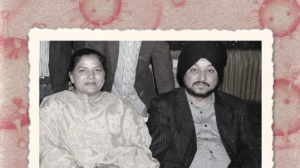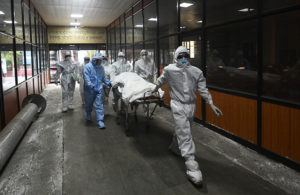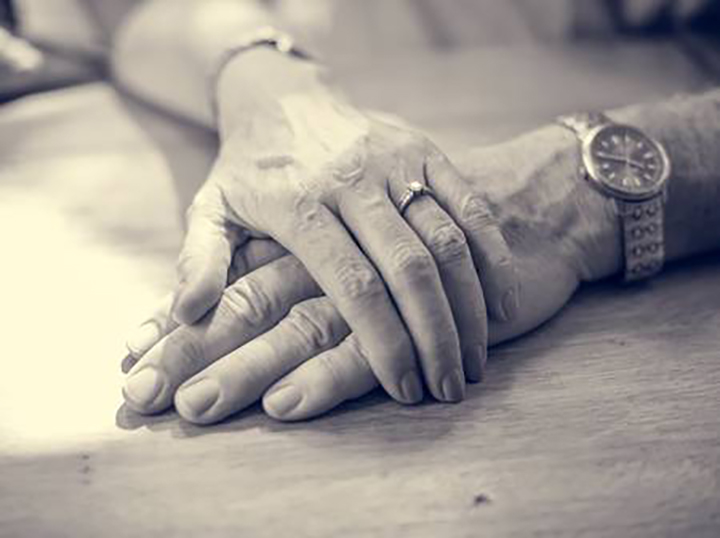ACP Surinderjit Kaur contracted Covid in May and her husband Charanjit Singh soon after. She recovered and returned home, he didn’t
When police officer Surinderjit Kaur lost her husband, Charanjit Singh, to Covid-19 in Delhi, it is obligatory upon each one of us to feel a deep sense of loss. There is no other way to save our inner humanity.
She is a senior police officer, an assistant commissioner of the Delhi police, who had risen through the ranks. He was a businessman. Their young son is settled in Canada. By all accounts, this was a family which represented the Indian middle class dream.
But there are more layers to the story of this family, far wider and deeper than just a family losing a loved one to a deadly virus. Thousands are suffering that fate. Thousands more will. And we need to take each death personally. No one’s life is less precious.
Each one has a story of life: the beggar you see everyday at the street corner, the man helming your grocery shop, the cobbler you pass by near your office, the paanwallah, the attendant in your car park, the boss you hate, the colleague you admire, the canteen guy, the juice seller outside. They are all people, and all people have stories. The ones you listen to carefully touch you, the ones on which Bollywood makes movies live with you longer. The ones you do not get to know also make up the world, maybe someone else’s world. Human beings are made of stories.
These stories are dying. All these people made our world, and that world is dying. And sometimes, it is by dying that a story comes alive for us.
Ask a young child to draw a picture of a police officer and nine times out of 10, the kid will draw the picture of a male officer. The normative image often exposes our hidden or not-so-hidden biases. If the image of a family during Covid-19 times that comes to our mind shows a police officer bravely venturing out every day because duty calls, and shows a spouse who stays behind and takes care of the house, then you can bet that it is the male head of family who goes out and the woman who stays behind.
Also, the permanent connection between the man and the designation of being the head of the family underlines yet another ingrained prejudice of our times, corona or no corona.
That’s why the story of ACP Surinderjit Kaur is more educative for us, for our children, and for our times. She’s devastated, full of regret and blaming herself. Surinderjit lost the love of her life, the father of her child, the only man she would come back to after days good, bad and ugly in her job.
She was out because she was an officer in uniform on duty. Charanjit was home because he was a caring spouse and was taking care, was not venturing out because death lurked outside. Death still knocked and came inside.

And Surinderjit Kaur thinks she was the one who brought death home.
***
“My husband didn’t step out of the house when the lockdown started, but I went out daily because of my job…I will never be able to forgive myself,” Surinderjit said on Tuesday, June 16.
Charanjit Singh was 54. He passed away on Monday, fighting Covid at a Delhi hospital.
Surinderjit joined the Delhi police as a young officer. She was a station house officer, dashing in her uniform, adamant on proving herself, often spending 24 hours on the road, still more chalking up 36-hour shifts.
At home, her husband, a businessman, invariably doubled up as a mother to their little kid. He would look after the household. Surinderjit would often miss family functions and the husband would mark his presence to make up for her absence.
Their life seemed good to those outside because it was a beautiful story of a young couple bringing up a child in a home that has its routine everyday problems, issues, love, dreams, and conversations about a rosy future and, more often than not, the kid’s favourite ice cream.
It takes years for a family to build a life; to progress inch by inch, to make career moves step by step, to see a son growing, graduate high school, go for higher studies, and move to Canada.
Surinderjit is 57, due to retire in a couple of years. For long hours into the night, the husband and wife would talk about their future. They planned to join their son in Canada and even had a date in mind — 2023. Imagine the conversations this would have spurred in their house in Lajpat Nagar.
And then, the novel coronavirus exploded on the scene.
All that Surinderjit needed to say was that her husband was coughing a little bit, and she would have been told to stay home. All that she needed to say was that she was running a slight fever and no one would have insisted that a 57-year-old officer must report for duty.
But that is not the stuff Surinderjit Kaur is made of. She had been a front-rank fighter in the streets for years, and she was not going to take a step back and hide behind a door lest Covid find her.
A month ago, Covid found Surinderjit. She tested positive, and her husband followed suit. Within hours, her 80-year-old father also tested positive for the virus.
***
Now, please pause here. Think of the conversations each of them must have had while at hospital — of course, with one’s inner self only. It wasn’t possible to have a conversation with one’s spouse, with one’s son, with one’s parents. What must those conversations have contained? How many times would the mortal fear of death pulled down morale? How many times must one have pictured a loved one dying?

Every Covid death that we read about has all these stories behind it. And remember, we’re not reading about every Covid death; they’re not even publishing every Covid death. Instead, we read a number, a statistic, every day, which doesn’t destroy us deep inside. Meanwhile, we go about our lives, washing hands, sanitising packets, disinfecting surfaces.
In Indraprastha Apollo hospital, both husband and wife spent some time in separate wards. His oxygen levels plunged. First, they saw each other on video, until that was no longer possible. Charanjit sent her WhatsApp messages: details of bank accounts, details of deposits, a lot of financial stuff. This was real.
Why, she asked. Why are you sending me these details?
“Because you would need them,” he said.
This is death talk between people who loved each other all their lives, saw each other every morning and every evening, year after year, decade after decade. And they could not see each other; time was running out. He could not afford to write long messages detailing how much he loved her; how when he was young, he was so taken in by his dashing wife in a uniform; how when their son was studying at school and they would play good cop, bad cop, he would often want to be the bad cop so his wife could remain the good cop that the son could confide in.
These, and a million other tales from innumerable years.
But Charanjit’s words and messages were dictated by oxygen levels, reduced to dry texts on data, money and property, not love and dreams and ice cream in Canada. In the hospital, the sterile atmosphere, and the stench of sickness and death, allowed limited conversation via phones.
On May 26, Surinderjit came home. She had recovered. Charanjit did not. He never did.
***
There are many details we’re skipping: video calls, beeps from ventilators, the ghostly shadows of doctors and nurses in PPE kits, Surinderjit’s visits to temples and mosques and churches and gurdwaras, praying that her husband would come home. Her regrets that though he’d stayed home, he had not been safe, since she hadn’t chosen to stay home too.
Instead, she had chosen to be a warrior. Because someone needs to patrol the streets, someone needs to keep things under control, someone needs to keep the country running, someone needs to tell people to stay indoors.
That someone has to be outdoors.
On Tuesday, June 16, their son watched his father’s last journey through a video link, from the ambulance right till the entrance to the crematorium. In normal times, they would have allowed you a few more steps inside, but then, there’s a pandemic in the air. And a video link allows you to watch only so much.
Charanjit was a man who laughed, told jokes, loved his wife, raised a son, nursed a million dreams, and died. Cry for him — and for every man, woman and child that is lost to this virus. And for every young or middle-aged man and woman who lost a job in these tough times; for every child who went hungry since our politics cannot match the size of our problems; for every step of a million taken by our countrymen to walk to their homes because our politics left them in the lurch; for this woman whose story might one day inspire children to draw pictures of female police officers.
They aren’t numbers. They are stories.
SP Singh is a Chandigarh-based, currently working from home journalist whose wife ventures out in uniform, often spending a day or a night at the IGI airport, incessantly worried that she might end up bringing the virus home for her husband.
www.newslaundry.com





